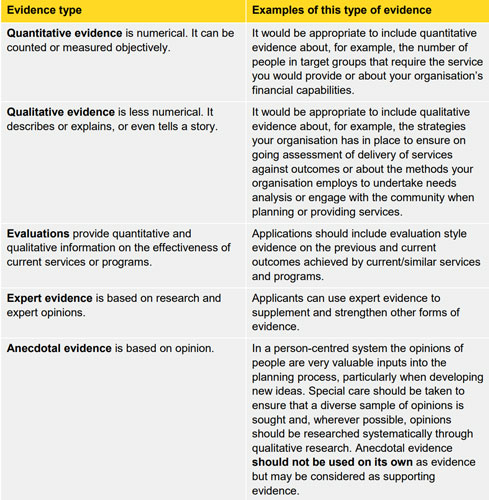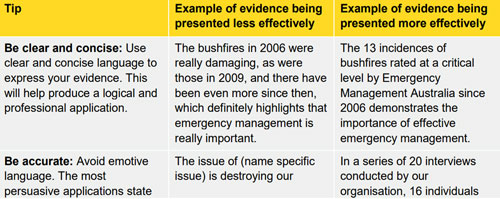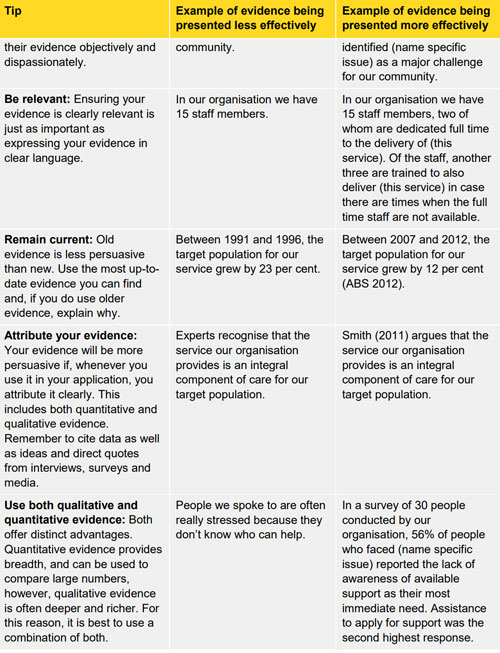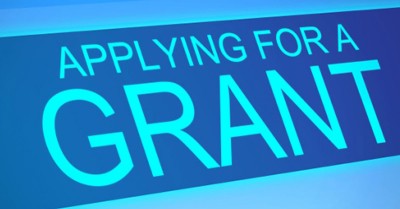When applying for grant funding it is crucial to provide evidence that supports your application. Evidence enables you to demonstrate your understanding and the services need for the grant funding.
Using Evidence When Applying For Grants
Documenting evidence along with your application also:
- demonstrate your capabilities
- demonstrate your linkages within a community
- emphasise the scale or importance of an issue
- strengthen an argument for a service by demonstrating its past performance, and
- illustrate how the service is accepted or received by intended recipients.
Using Evidence To Support Your Claims
When applying for grant funding you will need to demonstrate evidence against the selection criteria, you should be providing evidence to support your claims which may include:
- your understanding of the need for the funded Activity in the chosen community/ communities
- how the implementation of your proposal will achieve the Activity objectives for all stakeholders, including value for money and existing linkages within the service area
- your experience in effectively developing, delivering, managing and monitoring activities to achieve the Activity objectives for all stakeholders
- your organisation’s capacity and your staff capability (experience and qualifications) to deliver the Activity’s objectives in the chosen community/communities, and
- a service delivery model that includes effective partnerships, linkages and referral pathways that directly contribute to the Activity outcomes.
Types Of Evidence
When applying for grant funding when documenting evidence, there are five basic categories of evidence:
- quantitative evidence,
- qualitative evidence,
- evaluations,
- expert evidence and
- anecdotal evidence
The table below describes each:

Collecting Evidence
When collecting evidence to prepare for you grant application, it's important to do so through a variety of different sources which will support your services application for funding.
Sources include:
- data from your own records and experiences as a service provider (eg annual reports or surveys)
- data available from the Australian Bureau of Statistics (eg census data or crime statistics),
- program or service evaluations, reports released by research bodies, government departments, or not-for-profit organisations.
- needs analyses or expert advice
- interviews – conducted by your own organisation or another – with clients or subject experts, with a focus on benefits of proposed services to the local community
- content from broadcast or social media, and
- public meetings and fora.
Preparing Evidence Effectively
Once you have collected your evidence to meet the selection criteria through a variety of sources, it needs to be presented effectively.
Here are some examples:


Making a good grant application will enable you to be more successful of getting the grant approved.
Reference:
Strong Evidence - A Guide To Supporting Your Grant Application, Community Grants Australia



 As an Educator in Australia, your pay rate falls under the Children’s Services Award 2010. This award states the minimum amount that an employer can
As an Educator in Australia, your pay rate falls under the Children’s Services Award 2010. This award states the minimum amount that an employer can When working as a qualified Early Childhood Teacher (with a university degree) within a service, your rate of pay will come from the Educational Services
When working as a qualified Early Childhood Teacher (with a university degree) within a service, your rate of pay will come from the Educational Services When working as a Diploma Qualified Educator your pay rate is from the Children's Services Award 2010. This Award states your minimum rate of pay
When working as a Diploma Qualified Educator your pay rate is from the Children's Services Award 2010. This Award states your minimum rate of pay When working as a Cert 3 Qualified Educator, your pay rate is from the Children's Services Award 2010. This Award states your minimum rate of
When working as a Cert 3 Qualified Educator, your pay rate is from the Children's Services Award 2010. This Award states your minimum rate of Educational Leaders play a crucial role in their early childhood service by ensuring that the educational program aligns with best practices and supports the holistic
Educational Leaders play a crucial role in their early childhood service by ensuring that the educational program aligns with best practices and supports the holistic In early childhood education and care, ratios are more than a technicality—they are a frontline safeguard. Every child deserves responsive supervision, emotional connection, and developmental
In early childhood education and care, ratios are more than a technicality—they are a frontline safeguard. Every child deserves responsive supervision, emotional connection, and developmental Here’s a comprehensive Mobile Phone and Smart Watch Policy tailored for early childhood education and care (ECEC) services in Australia, aligned with the latest 2025
Here’s a comprehensive Mobile Phone and Smart Watch Policy tailored for early childhood education and care (ECEC) services in Australia, aligned with the latest 2025 With the new national child safety reforms kicking in on 1 September 2025, early childhood services like yours have a real opportunity to lead the
With the new national child safety reforms kicking in on 1 September 2025, early childhood services like yours have a real opportunity to lead the The Sea of Fish Challenge is a national initiative that invites children, educators, families, and communities to create and display fish artworks as a symbol
The Sea of Fish Challenge is a national initiative that invites children, educators, families, and communities to create and display fish artworks as a symbol Across the early childhood education and care sector, educators are sounding the alarm: current staffing ratios are insufficient to deliver safe, meaningful, and developmentally appropriate
Across the early childhood education and care sector, educators are sounding the alarm: current staffing ratios are insufficient to deliver safe, meaningful, and developmentally appropriate


